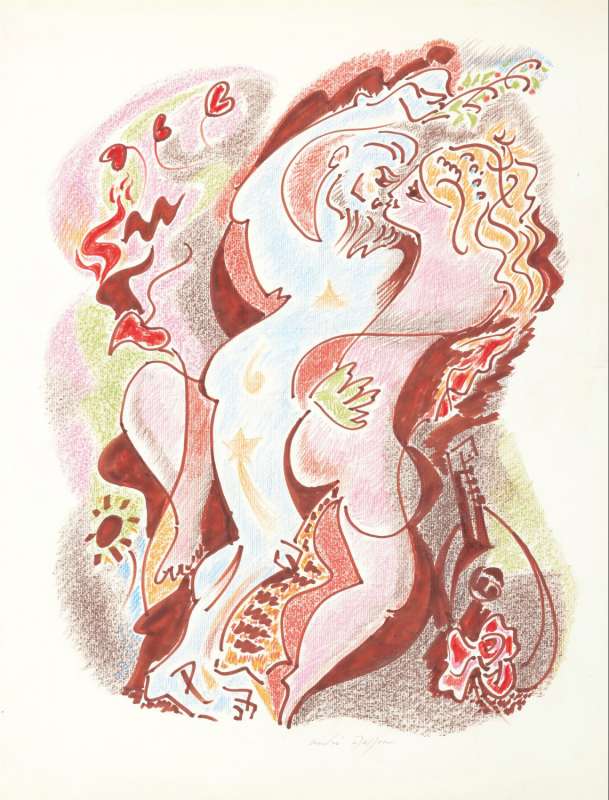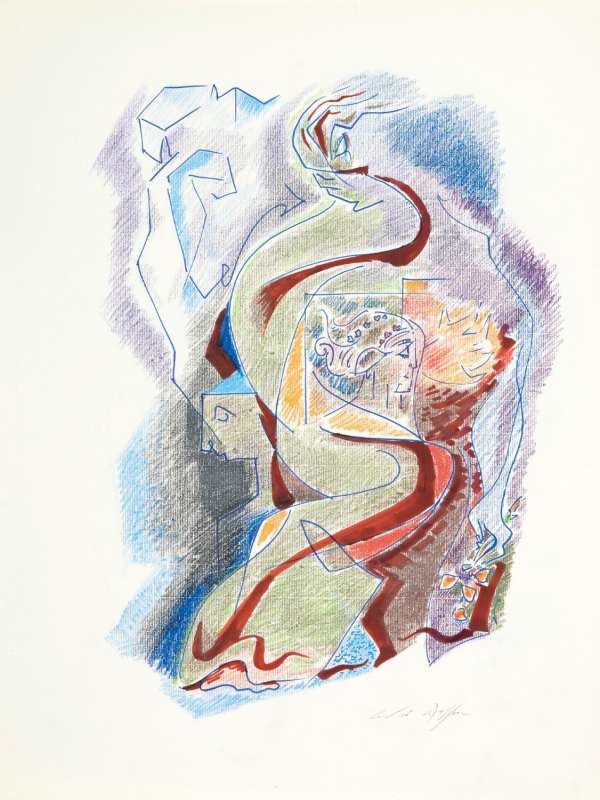Le Coin des Arts–Le Marais is pleased to present a temporary hanging of drawings by André Masson (1896–1987), both a companion and a rebel of Surrealism.
From Saturday July 10 to Saturday July 17 at the gallery, 53 rue de Turenne, Paris, 3rd district.
From 11 a.m. to 1 p.m. and from 2 p.m. to 6 p.m.
The artist lived through the turmoil of the 20th century; left for dead on the battlefield at Chemin des Dames in 1917, he miraculously survived. In 1924 he joined André Breton’s Surrealist movement, and later the circle of Georges Bataille, with whom he shared a profound questioning of cruelty. In 1940 he left for the United States. Masson became one of the most influential European artists in exile, particularly impacting the art of Jackson Pollock (1912–1956) and Arshile Gorky (1904–1948).
Masson’s work is an art of movement, of life — Dionysian, to quote the artist.
From the former collection of Roger Passeron, a discerning collector and friend of Masson, the six drawings in our hanging lead us into the artist’s world: a world populated by living beings, landscapes, and powerful, often mysterious signs.
We would also like to present a very fine series of original lithographs by Masson, who was an outstanding printmaker. Illustrator of many books, printmaking was for him an essential field of exploration.
Our hanging will also be an opportunity to show three books illustrated by Masson from the collection of Roger Passeron: the famous Sonnets by Louise Labé, the great 16th-century poet who wrote of love; the two volumes of Malraux’s L’Espoir; and the volume of Les Conquérants, also by Malraux.
A wonderful moment of delight awaits.
Receiving Breton in his studio in 1924, Masson sold him his canvas The Four Elements and joined the group of Surrealists, whose Manifesto (written by Breton) was published that October. The text defines “Surrealism” as: “pure psychic automatism by which one proposes to express—verbally, in writing, or by any other means—the real functioning of thought. Dictation of thought in the absence of any control exercised by reason, outside any aesthetic or moral concern.”13.
Receiving Breton in his studio in 1924, Masson sold him his canvas The Four Elements and joined the group of Surrealists, whose Manifesto (written by Breton) was published in October. The text defines “Surrealism” as: “pure psychic automatism …”13.
In 1928, he travelled to the Netherlands and Germany and began to study printmaking.
His American period marks an important shift in his intellectual foundations: in 1943 he broke definitively with André Breton, and from then on his art ceased to refer to fantasies born of the unconscious; and in early 1945 he received Jean-Paul Sartre at his home, then a special correspondent for Combat and Le Figaro, with whom he would collaborate upon returning to France.



Secure payment
3DSecure 2.2

Free DHL Express delivery from €1,200
Carefully prepared parcel
Parcel tracking

Shipment insured
for the value of the artwork, covering theft and damages

Fairest prices
Certificate of authenticity
Two galleries in Paris
Receive an email as soon as a new artwork is added for this artist
Your message has been sent ! We will get back to you as soon as possible.
Please fill in the form if you need further information such
Please fill in your email address, an email will be sent with a link to update your password.
You can now place orders and track your orders.
To save your wishlist, you can log in or create an account :